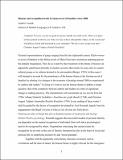Files in this item
Honour and recognition in the German novel of banditry ca 1800
Item metadata
| dc.contributor.author | Cusack, Andrew Thomas | |
| dc.date.accessioned | 2016-01-19T15:40:08Z | |
| dc.date.available | 2016-01-19T15:40:08Z | |
| dc.date.issued | 2016-03-01 | |
| dc.identifier | 240145759 | |
| dc.identifier | 7569885f-848d-4ccb-8966-9b0f2633fb4f | |
| dc.identifier | 84962513362 | |
| dc.identifier | 000372903500003 | |
| dc.identifier.citation | Cusack , A T 2016 , ' Honour and recognition in the German novel of banditry ca 1800 ' , Cultural Dynamics , vol. 28 , no. 1 , pp. 27-40 . https://doi.org/10.1177/0921374015623386 | en |
| dc.identifier.issn | 0921-3740 | |
| dc.identifier.other | ORCID: /0000-0002-4187-1959/work/60196907 | |
| dc.identifier.uri | https://hdl.handle.net/10023/8042 | |
| dc.description.abstract | This article performs a reading informed by Honneth’s theory of recognition of the two best-known German novels of banditry of the 1790s, Johann Heinrich Zschokke’s Abaellino der große Bandit (1794) and Christian August Vulpius’ Rinaldo Rinaldini (1799) in an effort to understand how popular literature participates in and reflects upon the discourse on honour and recognition around 1800. Its status as popular genre makes the novel of banditry (Räuberroman) a potentially interesting source on shifts in the theory and practice of honour as experienced by ordinary Europeans at the turn of the 19th century. The genre was found to relate to the honour discourse not directly, but in the manner of a heterotopia, simultaneously located outside that discourse and referentially connected to it. Taken in isolation, the novel of banditry is not an informative source on the changing role of honour and new patterns of intersubjective recognition in late 18th century Europe. Seen as part of a particular constellation of textual production and reception, however, the genre sheds light on the aporias of honour experienced by those socially marginal ‘new readers’ intent on exploiting literature in the struggle for enhanced social recognition. | |
| dc.format.extent | 200787 | |
| dc.language.iso | eng | |
| dc.relation.ispartof | Cultural Dynamics | en |
| dc.subject | Autodidacts | en |
| dc.subject | Axel Honneth | en |
| dc.subject | Honour | en |
| dc.subject | New readers | en |
| dc.subject | Räuberroman | en |
| dc.subject | Theory of recognition | en |
| dc.subject | PT Germanic literature | en |
| dc.subject | BDC | en |
| dc.subject | R2C | en |
| dc.subject.lcc | PT | en |
| dc.title | Honour and recognition in the German novel of banditry ca 1800 | en |
| dc.type | Journal article | en |
| dc.contributor.institution | University of St Andrews. German | en |
| dc.identifier.doi | 10.1177/0921374015623386 | |
| dc.description.status | Peer reviewed | en |
This item appears in the following Collection(s)
Items in the St Andrews Research Repository are protected by copyright, with all rights reserved, unless otherwise indicated.

